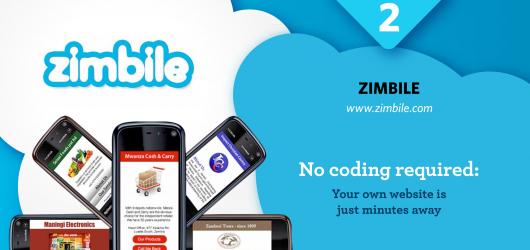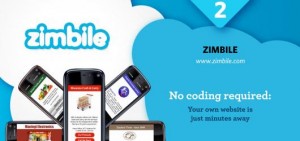Development occurs on different levels across the world. The interesting thing about development in Africa is that it doesn’t just come with its problems; it also comes with a peculiar set of opportunities. These allow for brilliant innovations, creative idea surfing and very unique implementations.
Our app in focus this week is Zimbile – a mobile website building application.
Overview
The guys at Zimbile like to refer to it as a project that helps businesses and individuals across Africa build fast loading, optimized mobile websites in a matter of minutes. All without any technical knowledge or level of expertise. Zimbile can help anyone create, publish and share a mobile website very quickly, and at no cost at all.
Peculiar Problem It Solves
Zimbile fills the mobile web gap for individuals, and small and medium enterprises in Africa. Before now, one common complaint has been that we do not have enough local African content online and this creates a huge platform to bridge that gap.
It has not been the easiest of tasks convincing small businesses that having some form of web presence will make a difference to their bottom line. Now, Zimbile creates a platform to try it out at no cost, and examine the return on effort invested. It also stands out as a major contribution, considering the mobile boom going on across Africa.
Unique Feature
In a few easy steps, Zimbile helps small businesses and individuals enter the online world, by building app form mobile websites, all in a matter of minutes. The same websites can be pushed via social media, helping to maintain relationships with customers and obtain feedback. It also serves as a platform for individuals to share their local content with the world.
It is unique in its approach, seeing that the user needs almost no expertise at all to put together this mobile site. And all this can be done in such a short time. It must be mentioned that Zimbile seems to take to the next level previous initiatives of search giant Google, to get local businesses online by providing mobile ready and a more relevant optional platform.
Value Proposition
Zimbile is a one-year old Zimbabwean start-up, developed by Simon Kaguramba in July, 2011 to help non-techies create valuable mobile websites under five minutes.
According to Kaguramba, “The goal was to build Zimbile in a way that anyone could build and publish a basic mobile website within minutes, without all the hassles of setting up software, domain names and hosting.”
They have started with mobile and may probably remain only on mobile, considering the current developmental trends around the industry. Having only just moved out of the beta testing phase recently, the application is now live. In addition to this, the team has rolled out a second version with more features.
With Zimbile, users can sell products and services on mobile, promote an event, share knowledge, or even make a mobile version of an existing website.
Potential Coverage
Zimbile has reached 98 countries, with 10percent of that number outside Africa. Although popular in countries like India and the Philippines, the bulk of Zimbile users are in Nigeria, South Africa and Zimbabwe.
According to Kaguramba, “Up to half of our customers are businesses of some sort, ranging from accounting firms in Namibia, borehole drilling companies in Nigeria, mobile-accessory retailers in Kenya, how-to guides in South Africa and churches in Zimbabwe.”
With the value it offers, it has the potential to expand much further in to more countries especially across Africa and Asia.
Critique
Presently, users only have access to Zimbile.com sub-domain names, which effectively means they cannot use their own custom domains e.g. userwebsitename.zimbile.com.
Creating a customized domain option would add more leverage to the application’s already huge potential list, even if it will come at a cost. We hear it is being considered as an option in the future.
Conclusion
Something most start-ups must realize was well explained by Simon Kaguramba who says, “Over the years, I have learnt that customers will pay for you to solve their pain as opposed to offering a nice-to-have product or service.” He also mentioned that while simplicity was initially the most important element of the website’s design, he now has users requesting extra functionality.
Having built a minimum viable product, and moving on to test the market, even without knowing then how he was going to make money from Zimbile, Simon took a great step which further bolsters the saying “if you create value, the money will come.”
If you have used Zimbile before now, or you might be convinced to deploy it on the basis of what you have read, please share your thoughts in the comments box below.
About the Author
Akinola Odunukan is an entrepreneur in love with all things ‘Techy’. A Computer Engineer,Content and Concept Developer plus Social Media Buff, who is quite passionate about Leadership and Personal Development. He has authored two books: “From Chap to Champion” and “The Legendary Warrior Mindset” published on Amazon and Smashwords. Keeping tabs on great things happening within the Tech space, is just one of the things he does. Follow him on twitter @dekynsIV




